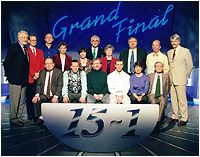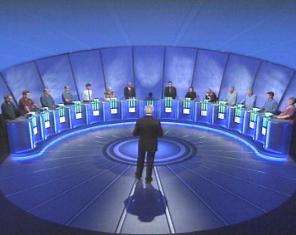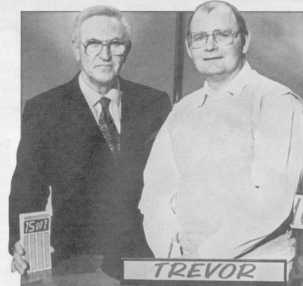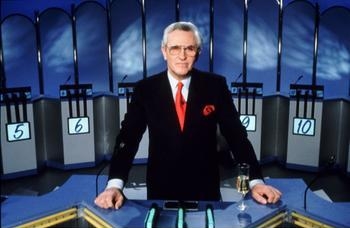Fifteen-to-One
(→Trivia) |
(→Key moments: Fact added) |
||
| Line 59: | Line 59: | ||
At the start of 1999, former series champion Bill McKaig scored the theoretical maximum of 433 points in the final round - by answering all 40 questions correctly at 10 points a throw, 10 points each for his three remaining lives, and 3 points for the three lives he had remaining from the first two rounds. | At the start of 1999, former series champion Bill McKaig scored the theoretical maximum of 433 points in the final round - by answering all 40 questions correctly at 10 points a throw, 10 points each for his three remaining lives, and 3 points for the three lives he had remaining from the first two rounds. | ||
| + | |||
| + | At the end of some grand finals, announcer Laura Calland would appear in-vision to present the champion with the prize. | ||
That glorious out-take when WGS drops his question cards... | That glorious out-take when WGS drops his question cards... | ||
Revision as of 14:17, 27 February 2007

Contents |
Host
Co-host
Voice-over: Anthony Hyde (early series), Laura Calland, Sarah Wynter, Philip Lowrie (alternating)
Broadcast
Regent Productions for Channel 4, 4th January 1988 to 19th December 2003.
Synopsis
Words can't describe how simple yet brilliant this show was, but we'll try. Fifteen contestants started off with three lives and the idea was to not lose lives by not getting questions wrong. Simple! Yet brilliant.
Round one began with each of the fifteen contestants being asked two questions each. If they got one wrong they lost a life but if they got both of them wrong they were automatically eliminated.
 Questionmaster William G. Stewart (centre) gets ready to ask the questions to the fifteen contestants in the distinctive semi-circle behind him
Questionmaster William G. Stewart (centre) gets ready to ask the questions to the fifteen contestants in the distinctive semi-circle behind himRound two was slightly different, a veritable mental duel meeting Hot Potato. A player was asked a question. If they got it wrong they lost a life. If they got it right they nominated whoever they wanted to answer the next question. If that person got it wrong the nominator got to choose somebody else. This kept going until there were only three people left.
Question or Nominate?
After the break, the three people left were given a single point for every life they had left before the break and a clean set of three lives. The idea now was to get a high a score as possible. This round had forty questions and each answer was worth ten points. The first questions were on the buzzers but as soon as somebody got over thirty points it changed to 'Question or Nominate'. If they chose 'Question' they took a question themselves, to build up their score, and if they chose 'Nominate' somebody else took the question. No matter what your score, if you lost your three lives you were out.
When there was only one person left they were the winner but they were allowed to answer as many of the remaining questions as they could to build up their score and if they made it past the 40th question they were given a ten-point bonus for every life they had left.
 The Grand Final
The Grand FinalAt the end of the series the top fifteen scoring players battled it out in the ultimate duel which was the Grand Final for a piece of two-thousand year old pot, usually.
Overall, the programme was usually engrossing - when you got an interesting episode, you got an interesting episode. It was a crying shame they axed it at the end of 2003 in favour of Beat the Nation, which admittedly isn't bad but not a patch on this fine show.
 A more recent version of the set
A more recent version of the setSchool's out for Summer
In 1999, the first (and, as it turned out, only) schools series started. Five pupils from three schools competed. In the first round, each child was asked two questions, winning 10 points for their team. In round two, each child faced three questions - 10 points if they answered it themselves, or 5 if they needed to confer. The final round was played with one nominated child from each school competing for 30 questions on the buzzer. This was the only time the "three lives" concept came into play - if they incorrectly answered any three questions, they were out of the game.
Some of the spirit of the show was lost by the de-emphasis on the three lives, but then again we can't have the kiddies upset, can we?
Key moments
At the start of 1999, former series champion Bill McKaig scored the theoretical maximum of 433 points in the final round - by answering all 40 questions correctly at 10 points a throw, 10 points each for his three remaining lives, and 3 points for the three lives he had remaining from the first two rounds.
At the end of some grand finals, announcer Laura Calland would appear in-vision to present the champion with the prize.
That glorious out-take when WGS drops his question cards...
 "Two questions each in the first round... oh, bugger"
"Two questions each in the first round... oh, bugger"And who's that at number 7? It's future WWTBAM jackpot winner Ingram Wilcox.
Inventor
Based on an original idea by John M. Lewis.
An interview with John M. Lewis can be found at Andrew Wiseman's 625 page.
Theme music
Paul McGuire was credited as "Musical Director".
Trivia
In 1999, the first schools series was commissioned. Twenty-five of the leading players came together for the Millennium Quiz, on Christmas Day 1999 for a 110-minute behemoth of a show featuring 350 questions over five rounds. This was won by quiz regular Kevin Ashman. Other specials included a few celebrity specials, a comical quiz for Comic Relief and (as part of C4's Without Walls arts strand) an hour-long feature on the Elgin Marbles.
A special programme, called Fifteen-to-One Scrapbook, provided a fascinating insight into the programme. It was presented by Stewart as well as voice-overs Calland and Lawrie in vision. As well as the usual banter about the Elgin Marbles, it covered topics such as what's on William G's question cards and an interview with the programme's eldest viewer.
Fifteen-to-One somewhat unexpectedly hit the headlines in 1998 when one of its former contestants, one Trevor Montague (pictured below), was sued by Regent Productions, the makers of the programme. Montague broke the rule which states that losers on the programme cannot take part again. However, after being knocked out in 1989, Mr Montague entered again in 1992 under the name Steve Romana, wearing a T-shirt and earrings to disguise his appearance. When a viewer saw a repeat of the series on Challenge TV, they noticed the uncanny resemblance between Mr Montague and "Steve Romana", and contacted Channel 4. In 2001, Montague came out with a quiz compendium, The A-Z of Almost Everything, with a foreword by Magnus Magnusson.
 William G. Stewart with Trevor Montague
William G. Stewart with Trevor MontagueNot only did William G both present and produce the show, he was also involved in writing the questions, particularly those on historical subjects.
The credits on one show featuring one Carl Majors from Ilfracombe listed his job as a Fudge Packer - he jests, shurely?
Champions
| 1988 | Jon Goodwin | 1997 | Trevor Montague |
| Mal Collier | Bill Francis | ||
| 1989 | Kevin Ashman | Nick Terry | |
| Andrew Francis | 1998 | Nick Terry | |
| 1990 | Anthony Martin | Bill McKaig | |
| Mike Kirby | Paul Hillman | ||
| 1991 | Thomas Dyer | 1999 | Nick Terry |
| Anthony Martin | Nick Terry again | ||
| 1992 | Julian Allen | 2000 | Les Arnott |
| Barbara Thompson | Dag Griffiths | ||
| 1993 | Anthony Martin | Matti Watton | |
| Glen Binnie | 2001 | Daphne Fowler | |
| 1994 | Stanley Miller | Daphne Fowler again | |
| Leslie Booth | 2002 | Matti Watton | |
| 1995 | Leslie Booth | David Good | |
| Ian Potts | 2003 | Jack Welsby / David Stedman (tie) | |
| 1996 | Arnold O'Hara | John Harrison | |
| Martin Riley |
Champion of Champions
1997 Mal Collier
Millennium Quiz
1999 Kevin Ashman
Schools Series
1999 Audenshaw School
Merchandise
Fifteen to One - 2002 for 2002
Book: 2002 questions from the hit TV show
Fifteen to One - 2001 for 2001
Book: 2001 questions from the hit TV show
Fifteen to One - 2000 for 2000
Book: 2000 questions from the hit TV show
Brain Men: A Passion to Compete by Marcus Berkmann
Not only is this an extremely comprehensive revue of Quiz Culture, it has the added advantage of being hilarious. The book covers everything from pub quizzes to Fifteen-to-One (on which the author appeared twice), and from trivia machines to quiz tournaments. Highly recommended for any quiz fan.
Web links
Quizplayers's 433 challenge - See if you could match Bill McKaig's feat
See also
Weaver's Week: Fifteen To One Remembered


